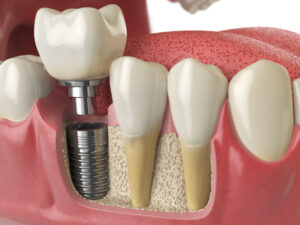What is the Success Rate for Dental Implants?
 Dental implants are one of the most wonderful ways to restore missing teeth! They are also a significant financial investment. Any time you invest in something, it is important to understand the long-term success rate or a prognosis of how long something will last.
Dental implants are one of the most wonderful ways to restore missing teeth! They are also a significant financial investment. Any time you invest in something, it is important to understand the long-term success rate or a prognosis of how long something will last.
Dental implants have a very high success rate among all dental restorations. Some research studies show an average of more than 95% success at ten years after placement. Other studies show a lower success rate, and rather than looking for a perfect statistic (because there isn’t one . . . ), we should focus on why implants fail and how we can change the risk for failure.
What Factors Influence the Success of Dental Implants?
In order for a dental implant to achieve long-term success, it must maintain a healthy connection to the surrounding jawbone. Implants attach to alveolar bone (the type of bone making up our jaws and holding the teeth in place) through a process called osseointegration. Unlike the roots of teeth, which attach to the jawbone through a tiny ligament, implants connect directly to bone.
 The attachment to bone occurs in the first few months following the dental implant’s surgical placement into the bone. In order for this integration to develop and maintain a healthy connection, you must have healthy bone.
The attachment to bone occurs in the first few months following the dental implant’s surgical placement into the bone. In order for this integration to develop and maintain a healthy connection, you must have healthy bone.
Because we know that the presence of dental plaque causes gum disease in the jawbone, you must also have healthy gums and good oral hygiene to maintain long-term success of a dental implant.
The forces that a tooth or dental implant undergoes from chewing, clenching or grinding also impact the surrounding bone. It is essential that a dental implant has a crown that receives precise amounts and angulation of biting force. The right bite promotes good long-term health of an implant.
What Causes Dental Implants to Fail?
Dental implants fail when their connection to the jawbone never forms initially or forms initially but detaches later. There are a few different causes of this lack of attachment.
Failure to Form Attachment
In some cases, the bone never attaches to the dental implant after placement. This typically occurs as a result of a problem within the bone itself, like osteoporosis. A lack of good blood flow to the site of the implant surgery also impairs the bone’s ability to connect to the implant.
Loss of Attachment
It is also possible to lose the attachment to jawbone after it formed initially. The two main causes of this are gum disease and improper biting forces.
Gum disease is a chronic bacterial infection and inflammatory disease of the tissues surrounding the teeth, and it can occur around implants, too. Called peri-implantitis, this disease occurs when the bacteria in dental plaque produce toxins that penetrate the surrounding gums, and the body responds with inflammation. Chronic inflammation is destructive in nature, and it breaks the connection between implant and jawbone.
Because the attachment between bone and implant does not involve a ligament, there is no “shock absorber” present around the implant. That means that the biting forces have to be absolutely perfect. When an implant crown receives biting forces that are either too heavy or at the wrong angle, it can break the attachment to the surrounding bone.
What Does a Dental Implant Failure Feel Like?
The good news is that when a dental implant fails, it does not hurt. Because an implant failure involves a loss or lack of attachment to the bone, the implant often just falls out. You may feel it loosening, or you may have no idea there is a problem.
When we see you for consistent follow-up visits with professional teeth cleanings and dental x-rays, we can catch this bone loss in its earliest stages.
What Factors Increase the Risk for Implant Failure?
Researchers studying dental implants and their long-term success have identified several risk factors associated with increased risk of failure. People who fall into these categories will need to make changes in order to achieve the best chance of long-term implant success.
Smoking
Smoking and using other tobacco products increase the risk for implant failure because it causes a constriction of tiny blood vessels. This leads to a decrease in blood flow to various areas of the body, and impaired wound healing. Good blood flow is necessary to enable the implant to heal and attach to the jawbone.
Diabetes
Like smoking, diabetes causes a constriction of blood vessels to the extremities, and the gums are an extremity. Diabetic patients also have impaired wound healing due to lack of healthy blood flow. People with diabetes can improve their ability to heal by strictly controlling their blood sugar levels before and after any surgery.
Long-Term Use of PPIs for Acid Reflux
PPIs are proton pump inhibitors, a certain type of medication used to treat acid reflux. With long-term use, this drug affects the bone’s ability to heal. Studies show that patients taking PPIs have a two to three times higher risk for implant failure than those not taking the drug.
What Can I Do to Ensure Long-Term Success of my Dental Implants?
 First of all, you must choose the right implant dentist. Education and experience enable your dentist to provide you with the best implant outcomes. Dr. Ann has placed hundreds of dental implants over the last seventeen years, and she continues to undergo extensive continuing education in the implant dentistry realm.
First of all, you must choose the right implant dentist. Education and experience enable your dentist to provide you with the best implant outcomes. Dr. Ann has placed hundreds of dental implants over the last seventeen years, and she continues to undergo extensive continuing education in the implant dentistry realm.
Your dentist is responsible for the correct placement of the implant and management of the biting forces. YOU are responsible for the long-term care of the dental implant and its surrounding tissues.
This long-term care must include consistent professional teeth cleanings with your dental hygienist and great oral hygiene at home. Many dental implants have small gaps between the crown and the gums. You may need to use accessory tools to keep this area clean and free of dental plaque. Maintaining great oral health around your implant is essential to its long-term success.
More Questions about Dental Implants and Their Success?
Call Designer Smiles today to schedule an implant consultation with Dr. Ann. She can answer any questions you have about dental implants, assess your specific situation, and alert you to any risk factors that you may have for implant failure. She has successfully restored thousands of teeth with dental implants.
